
William Dale Fries Jr. was an American commercial artist who won several Clio Awards for his advertising campaigns. He was also a musician and is best known for his character C. W. McCall, a truck-driving country singer that he originally created for a series of bread commercials. Fries performed as McCall in a series of outlaw albums and songs in the 1970s, in collaboration with co-worker Chip Davis who also founded Mannheim Steamroller.
Mannheim Steamroller is an American neoclassical new-age music ensemble founded and directed by percussionist/composer Chip Davis in 1974. The group is known primarily for its Fresh Aire series of albums, which blend classical music with elements of new age and rock, and for its modern recordings of Christmas music. The group has sold 28 million albums in the U.S. alone.
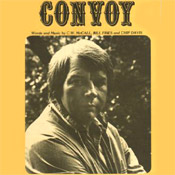
"Convoy" is a 1975 novelty song performed by C. W. McCall that became a number-one song on both the country and pop charts in the US and is listed 98th among Rolling Stone magazine's 100 Greatest Country Songs of All Time. Written by McCall and Chip Davis, the song spent six weeks at number one on the country charts and one week at number one on the pop charts. The song went to number one in Canada as well, hitting the top of the RPM Top Singles Chart on January 24, 1976. "Convoy" also peaked at number two in the UK. The song capitalized on the fad for citizens band (CB) radio. The song was the inspiration for the 1978 Sam Peckinpah film Convoy, for which McCall rerecorded the song to fit the film's storyline.

Christmas is the first Christmas album and sixth studio album released by American musical group Mannheim Steamroller. It was the band's first album to chart on the Billboard 200 album chart, peaking at No. 50.

Black Bear Road is an album by country musician C. W. McCall, released on MGM Records in 1975. It is largely considered the album which gave him the most significant boost of his career, almost entirely due to the hit novelty song, "Convoy", that hit the number one spot on both Billboard's Country charts and its Pop charts. The song itself was largely responsible for starting a nationwide citizens' band radio craze. The song "Black Bear Road" in turn popularized the now-infamous road itself, along with its "You don't HAVE to be crazy to drive this road - but it helps" sign.
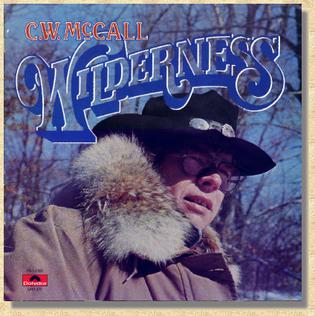
Wilderness is an album by country musician C. W. McCall, a pseudonym of singer and advertising executive Bill Fries, released on Polydor Records in 1976. As its title suggests, it focuses on subjects connected with nature, the environment and humans' impact on them. "There Won't Be No Country Music ", for example, is a statement on the environment's bleak-looking future and the effects of over-commercialization bordering on propaganda. "Crispy Critters", on the other hand, is the humorous telling of a true tale involving a group of hippies riding into a town and being forced away and threatened by the mayor.
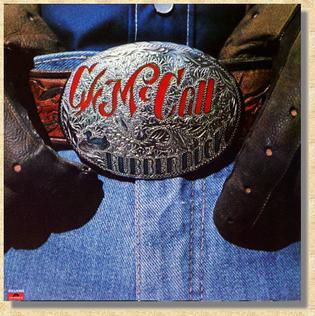
Rubber Duck is an album by country musician C. W. McCall, released on Polydor Records in 1976. It is his fourth album, released the same year as Wilderness, but concentrating on the themes the McCall character was popular for – trucking, as opposed to the various depictions of nature that could be found in Wilderness. Among others, the album contains the song "'Round the World with the Rubber Duck", a sequel to McCall's earlier wildly popular hit "Convoy", with many humorous and absurd elements added. "Audubon" is a quasi-autobiographical song, while "Ratchetjaw" is a take on trucker slang, with a multitude of CB-related terminology included in the lyrics.
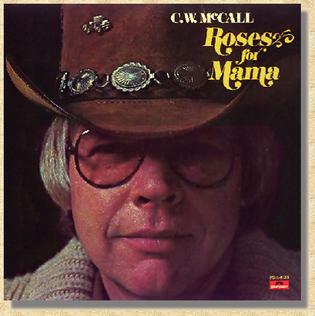
Roses for Mama is the fifth album by country musician C. W. McCall, released on Polydor Records in 1977. The album saw McCall singing several songs that were written by others, as opposed to his previous albums, which were written entirely by himself and Chip Davis. In fact, only three songs were written by the McCall and Davis; these are "I Don't Know ", "The Gallopin' Goose" and "Old Glory". "The Battle of New Orleans" is a cover version of Johnny Horton's popular 1959 song.

The Real McCall: An American Storyteller is an album by country musician C. W. McCall, released on American Gramaphone in 1990 and rereleased in 1999. It features revamped digital versions of some of McCall's better known songs, including "Convoy", "Wolf Creek Pass" and "Black Bear Road", rerecorded by the artist for the album. It contains more songs than any other release by the artist, with sixteen tracks in total. It features songs from most of McCall's albums, the exceptions being his later works, C. W. McCall & Co. and Roses for Mama. One new track, "Comin' Back for More", telling the story of the infamous American cannibal Alferd Packer, was recorded for the album and serves as its opener. Songwriting on the album is credited to lyricist Bill Fries and composer Chip Davis, who together have created nearly all original songs by McCall throughout the history of the character.

American Spirit is an album released on American Gramaphone in 2003 as a collaboration between Mannheim Steamroller and country musician C. W. McCall. The album focuses on American patriotic songs, hence the title. McCall contributed to a number of spoken word songs on the album and rerecorded his 1976 hit song "Convoy" for it; this was also the case with another song of his, "Wolf Creek Pass," which can be found on the album. McCall is a persona created by Bill Fries and Manheim Steamroller leader Chip Davis; Fries provides the vocals as McCall. This was the last album to feature C. W. McCall.
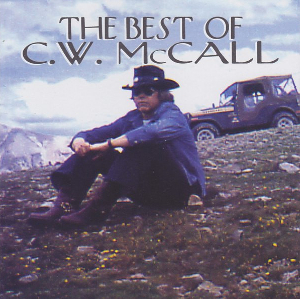
The Best of C. W. McCall is a greatest hits album released by country musician C. W. McCall on the PSM label in 1997. As with all "best of" releases from McCall, the album contains the wildly popular song "Convoy", as well as eleven others. The cover is almost identical to that of McCall's second album, Black Bear Road.

The Legendary C. W. McCall is a greatest hits album released on audio cassette only by country musician C. W. McCall in 1991, on the PolyGram label. It does not contain any songs that cannot be found on the most well-known "best of" releases from McCall, The Best of C. W. McCall and C. W. McCall's Greatest Hits. Several errors were made in the track listing; for instance, "Black Bear Road" was listed as "Black Beer Road", while "Crispy Critters" was given the title "Crispy Critter".

Four Wheel Cowboy is a greatest hits album by country musician C. W. McCall, released in 1989 on Polydor Records. All of the songs found on it, as well as three more, can be found on a later "best of" album, The Best of C. W. McCall. The release itself takes its name from a McCall song by the same name, which is featured on the album.

The London Chuck Berry Sessions is the sixteenth studio album by Chuck Berry, and consists of studio recordings and live recordings released by Chess Records in October 1972 as LP record, 8 track cartridge and audio cassette. Side one of the album consists of studio recordings, engineered by Geoff Calver; side two features three live performances recorded by the Pye Mobile Unit, engineered by Alan Perkins, on February 3, 1972, at the Lanchester Arts Festival in Coventry, England. At the end of the live section, the recording includes the sounds of festival management trying in vain to get the audience to leave so that the next performers, Pink Floyd, can take the stage; the crowd begins chanting "We want Chuck!". His backing band were Onnie McIntyre (guitar), Robbie McIntosh (drums), Nic Potter (bass) and Dave Kaffinetti (piano). Both McIntosh and McIntyre would later form The Average White Band.
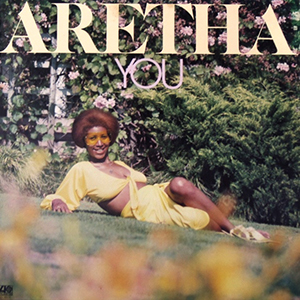
You is the twenty-second studio album by American singer Aretha Franklin, released on October 16, 1975, by Atlantic Records.
R. Crumb and his Cheap Suit Serenaders are an American retro string band playing songs from, and in the style of, the 1920s: old-time music, ragtime, "evergreen" jazz standards, western swing, country blues, Hawaiian, hokum, vaudeville and medicine show tunes. Underground cartoonist Robert Crumb was the band's frontman and album cover artist. Other members of the band include fellow cartoonist Robert Armstrong and filmmaker Terry Zwigoff.

C. W. McCall & Co. is country musician C. W. McCall's sixth and last album of original songs, released on Polydor Records in 1979, before McCall announced his retirement from the music industry. Out of the ten tracks, only one was written as a collaboration between McCall and Chip Davis, Fries's songwriting partner, while one other, "Silver Cloud Breakdown", was composed by Davis several years earlier and was featured in the movie Convoy, though it was not present on its soundtrack.

Room to Breathe is the twenty-fifth studio album by American country music singer Reba McEntire. It was released on November 18, 2003, by MCA Nashville Records. It was produced by Buddy Cannon, McEntire, and Norro Wilson.

Carolina Cousins is a studio album by American country music artist Dottie West. It was released in May 1975 on RCA Victor Records and was produced by Billy Davis. Carolina Cousins was West's 24th studio recording and contained a total of ten tracks. It would be her final album release with the RCA label before moving to United Artists Records in 1976. The album contained one single, "Rollin' in Your Sweet Sunshine," which became a minor hit in 1975.

Lyceum Theatre, London, England 5/26/72 is a four-CD live album by the rock band the Grateful Dead. It contains the complete concert recorded at the Lyceum Theatre on May 26, 1972 – the last show of the band's Europe '72 tour. It was released on July 29, 2022.


















